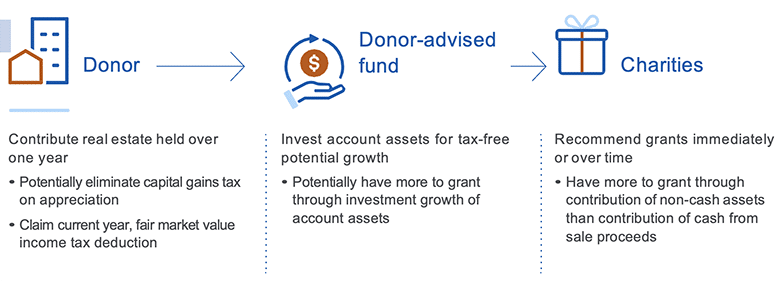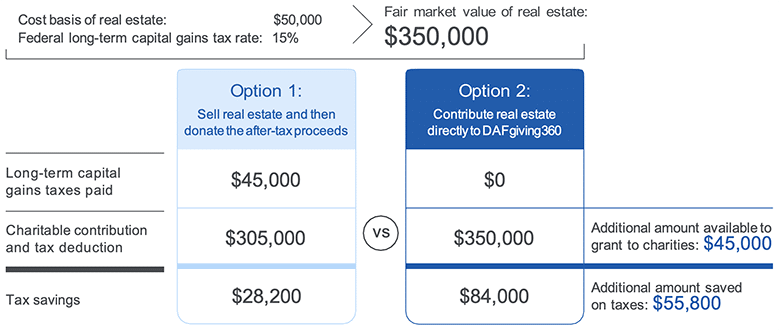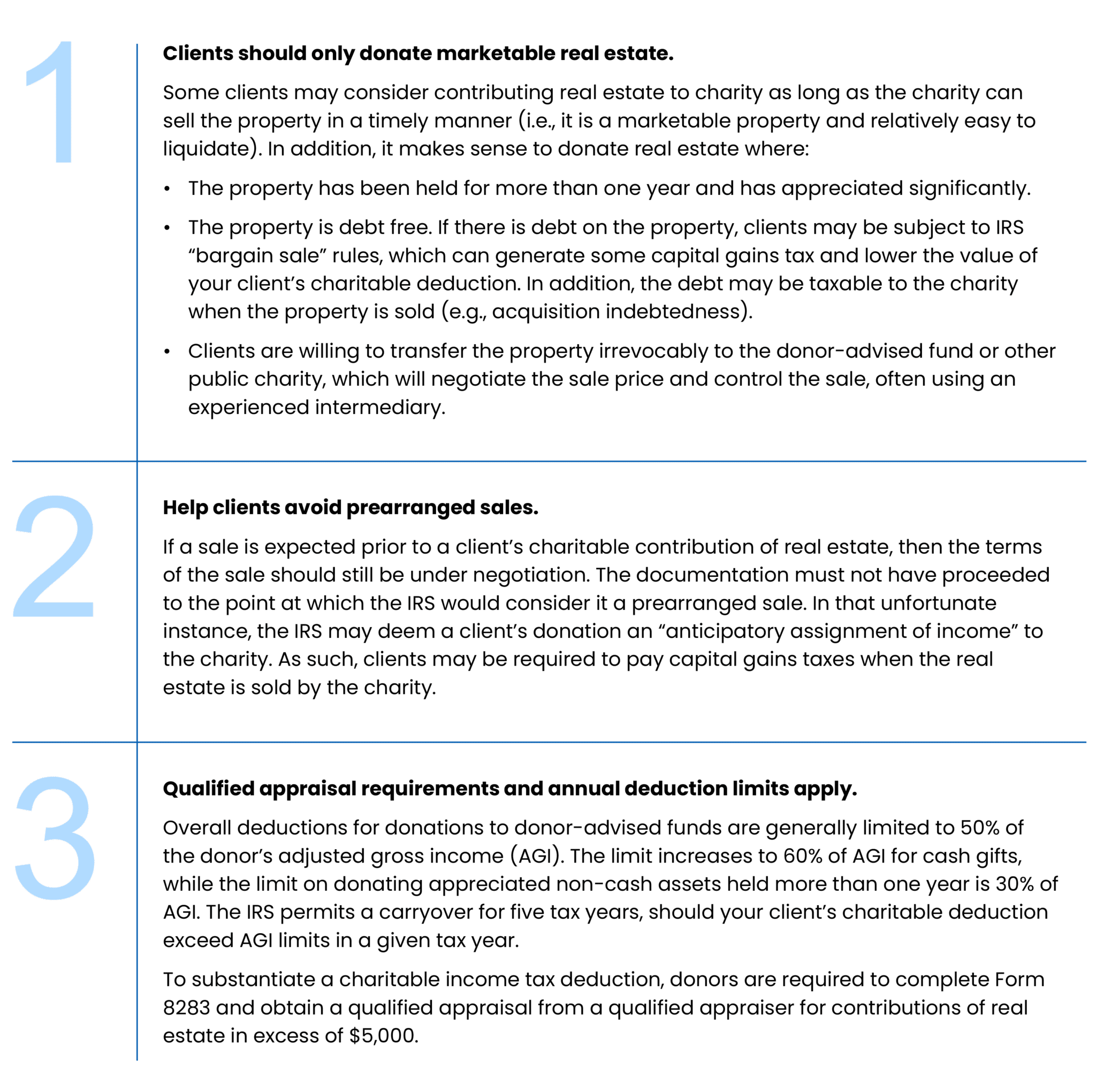
Whether it’s a family home, undeveloped land, a rental property, or some other investment, your clients’ real estate held for more than one year may be the most highly appreciated asset they own. Clients could face significant capital gains taxes when selling their real estate. Depending on your clients’ particular financial and charitable goals, donating real estate to a 501(c)(3) public charity, such as a donor-advised fund, could allow them to leverage one of their most valuable investments to achieve maximum impact with their charitable giving.
What are the benefits of donating appreciated real estate held more than one year?
For your clients who own real estate and are philanthropically inclined, donating real estate can unlock additional funds for charity in two ways. First, clients potentially eliminate the capital gains tax they would incur if they sold the real estate and then donated the proceeds, which may increase the amount available for charity by up to 20%. Second, your clients may claim a fair market value charitable deduction for the tax year in which the gift is made and may choose to pass on that savings in the form of more giving.
Donor-advised funds, which are public charities, provide an excellent gifting option for contributions of real estate, as the funds typically have the resources and expertise for evaluating, receiving, processing, and liquidating this type of gift.
How does gifting real estate to a donor-advised fund work?

“Often times we find, when we, start working with a client, they’re only giving to charities via cash gifts. So, one of our first conversations is to talk about using long-term capital gain property.”
— Financial advisor
Please be aware that gifts of appreciated non-cash assets can involve complicated tax analysis and advanced planning.
This article is only intended to be a general overview of some donation considerations and is not intended to provide tax or legal guidance.
In addition, all gifts to donor-advised funds are irrevocable. Please consult with your tax or legal advisor.
Market fluctuations may cause the value of investment fund shares held in a donor-advised fund (DAF) account to be worth more or less than the value of the original contribution to the funds.
Case Study: Help Clients Make a Larger Gift While Increasing Tax Savings
As he approaches retirement, Jim no longer wishes to manage a single-family rental property he inherited from his parents 25 years ago. Because Jim is a charitably minded client, he has considered selling his rental property and using the net sale proceeds to support various charities. Selling the rental property, however, will expose Jim to capital gains taxes on 25 years of appreciation. As it stands, Jim’s adjusted cost basis in the rental is $50,000 and the property has a current estimated value of $350,000.
Assuming a 15% federal capital gains tax rate upon sale of his rental property, Jim would realize capital gains on $300,000 of appreciation and owe an estimated $45,000 in federal capital gains taxes ($300,000 x 15% = $45,000). In this scenario, as shown in Option 1, after paying the federal capital gains taxes, Jim’s estimated net cash available for charitable giving is $305,000.
Jim’s financial advisor suggests that Jim could instead donate his rental property to a public charity, including to a donor-advised fund, as a way to potentially eliminate federal capital gains taxes ($45,000) and claim a fair market value income tax deduction ($350,000, based on a qualified appraisal), as shown in Option 2.

This hypothetical example is only for illustrative purposes. The example does not take into account any state or local taxes or the Medicare net investment income surtax. The tax savings shown is the tax deduction, multiplied by the donor’s income tax rate (24% in this example), minus the long-term capital gains taxes paid.
Certain federal income tax deductions, including the charitable contribution, are available only to taxpayers who itemize deductions and may be subject to reduction for taxpayers with adjusted gross income (AGI) above certain levels. Deductions for charitable contributions, for those who itemize, may be limited based on the type of property donated, the type of charity, and the donor’s AGI. Charitable contributions to public charities, including donor-advised funds, of capital gain property held for more than one year are usually deductible at fair market values. Itemized deductions for capital gain property held for one year or less are usually limited to cost basis. Gifts of long-term held and appreciated real estate in excess of $5,000 require a qualified appraisal from a qualified appraiser to substantiate fair market value for purposes of the income tax deduction.
Additional Considerations
In addition to the potential tax benefits described above, the following considerations may apply.

Interested in Learning More?
The Charitable Strategies Group at DAFgiving360 is a team of professionals with specialized knowledge about non-cash asset contributions to charities. Our team stands ready to support you and your clients, from initial consultation through asset evaluation, receipt, processing, and sale. We strive to provide unbiased guidance and frequent communication at every step of the process to help you and your clients make informed decisions and stay aware of the time required for each transaction.
For more information about the advantages of contributing appreciated non-cash assets, you and your clients can read an overview article or call us at 800-746-6216.
For Questions or Assistance with Charitable Planning:
- Visit our website at dafgiving360.org
- Call DAFgiving360 at 800-746-6216
- Follow DAFgiving360 on LinkedIn
DAFgiving360™ is the name used for the combined programs and services of Donor Advised Charitable Giving, Inc., an independent nonprofit organization which has entered into service agreements with certain subsidiaries of The Charles Schwab Corporation. DAFgiving360 is a tax-exempt public charity as described in Sections 501(c)(3), 509(a)(1), and 170(b)(1)(A)(vi) of the Internal Revenue Code.
Contributions made to DAFgiving360 are considered an irrevocable gift and are not refundable. Once contributed, DAFgiving360 has exclusive legal control over the contributed assets.
Contributions of certain real estate, private equity, or other illiquid assets may be accepted via a charitable intermediary, with proceeds transferred to a donor-advised fund (DAF) account upon liquidation. Call DAFgiving360 for more information at 800-746-6216.
These testimonials, statements, and opinions may not be representative of the experiences of other advisors. The testimonials are voluntarily provided and no compensation, free products or services, or any benefits were given in exchange for the testimonials. They are not indicative of future programs, services, performance, or success. Independent investment advisors and their firms are not affiliated with DAFgiving360. Some statements have been edited.
DAFgiving360 does not provide legal or tax advice. Please consult a qualified legal or tax advisor where such advice is necessary or appropriate. A donor’s ability to claim itemized deductions is subject to a variety of limitations depending on the donor’s specific tax situation.
©2025 Donor Advised Charitable Giving, Inc. All rights reserved. (0325-SUVY)







